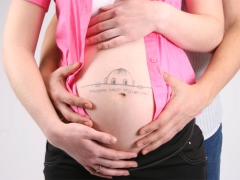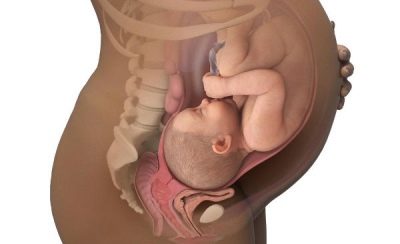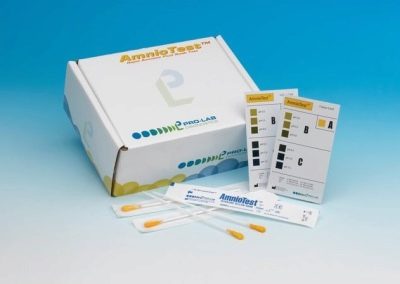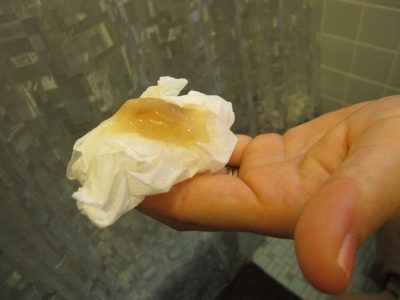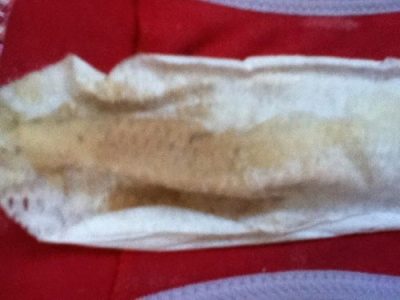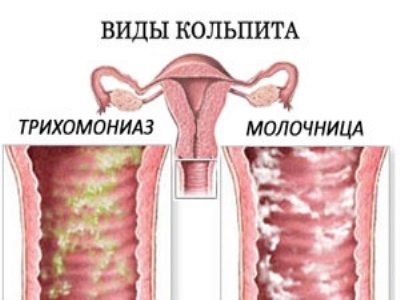41 weeks gestation: pain in the abdomen and unusual discharge
At the 41st week of pregnancy, women become especially sensitive and attentive to their state of health, because, according to the calculations of doctors, childbirth should have happened.
The estimated date of birth has passed, and the baby is not in a hurry to be born. What in this period can tell the pain in the stomach and discharge, we will tell in this article.
Physiological features
It became very difficult for a woman to carry a large and heavy belly. Uterus for 9 months of pregnancy increased almost 500 times. Now it occupies almost the entire abdominal cavity, displacing and squeezing the internal organs - the stomach, gallbladder, liver, bladder and intestinal loops. This can not cause those or other pain.
The child this week is usually pressed head to the exit of the small pelvis. It is ready for birth and weighs on average more than 3.5 kilograms. The load on all organs and systems is great, the woman feels tired, she wants to give birth quickly and feel light again.
Abdominal pain at this time is almost always a variant of the norm, the so-called "harbingers" of childbirth. But there are exceptions.
Why does the stomach hurt?
A fairly enlarged uterus shifts the center of gravity, which causes a variety of pains in the lower back, back, and sacrum. The stomach hurts because of an overstrain of sheaves and muscles of a peritoneum. But such pain usually does not have a permanent and long-term nature, intensifying only with a change in body position or movements.
The most common causes of abdominal pain are as follows.
Contractions - real and training
Stomach may ache from contractions. They are real, testifying about the beginning of childbirth, and false (training).
With false contractions, which in figurines usually appear in advance, and in multiparous ones, shortly before giving birth, the pain is pulling. Women say that it can be compared with how it pulls the lower back and lower abdomen during menstruation. The stomach is strained, "becomes stone", becomes rigid, then the fight recedes.
Training differ from genuine contractions by the complete absence of cyclicity, periodicity and gain. If a woman comes to rest and has a little rest when there are false contractions, the pain passes. With true bouts on this date, this simple advice will not work. Contractions will increase in time and strength of pain, regardless of the position of the body of the future mother in space.
In the hospital should be sent if the contractions are repeated every 5-7 minutes.
Digestive problems
Abdominal pain at week 41 can also cause indigestion, increased gas formation in the intestine. As already mentioned, the organs of the digestive tract that are squeezed by the uterus cannot work normally, and diarrhea, constipation, gas and nausea are completely normal for the last weeks of pregnancy. Pain in this case will be in the nature of tingling, cutting, there may be a feeling that the "belly twists."
The emergence of such pains is a reason to revise the diet, to exclude from it dairy products, excess meat, add vegetables and fruits rich in fiber.
Allocations - the norm
Normally, the excretions on this period become slightly more abundant than before, but they still must be light, white or yellowish, and free from an unpleasant odor. A woman should wear daily pads to quickly track possible changes in discharge.
Discharge of waters
If the water is completely removed, then it does not cause problems. Large amounts of warm, odorless water cannot be confused with urinary incontinence or other symptoms.
Questions usually causes leakage of amniotic fluid. It is manifested by the appearance of watery discharge, devoid of color and smell. Their number is usually small. Dribbling may increase with movements, during changes in body position.
Pharmacy amniotest and a gynecologist will help to distinguish water from urine, which pregnant women in late periods due to the pressure of the baby’s head on the bladder are often “missed”.
Mucus plug
Mucous discharges with clots may indicate that the discharge of mucus plug, which closed the entrance to the cervical canal and protected the fetus from infection during pregnancy, began.
Now the neck expands, softens, smoothes, and cork can no longer occupy its former place. She can move away in parts within a few days, and can come out at a time in the form of a clot of mucus with brownish or bloody streaks-patches.
Discharge after examination by a gynecologist
Brown and light brown discharge that appears after a cervical examination by a gynecologist this week should not surprise a woman. Manual inspection may trigger the passage of the plug if this has not yet happened. Then until the birth will be a few days-hours.
The discharge after a visit to the doctor may be short-lived. This happens when the loose and softened mucous membrane is injured and does not “signal” the onset of labor.
Pathological secretions
All of the above reasons are quite physiological and normal. However, at week 41, unusual discharge may also occur, which are symptoms of pregnancy complications. Spotting, dark pink, orange can talk about problems with the cervix or the beginning of placental abruption. When blood from the genital tract appears, a woman should immediately call an ambulance.
Splendid secretions of green, brown, gray with an unpleasant odor may indicate the presence of infection in the genital tract.
Thick white discharge with a sour or yeast odor is a sign of thrush. In the later periods, it often begins due to changes in the hormonal background. Infections and thrush are accompanied by itching and discomfort in the area of the external genital organs.
If time allows, it is necessary to have time to treat them before delivery, to reorganize the genital tract. If a woman with such secretions enters the maternity hospital, she will be assigned to an observational (infectious) department.
Natural childbirth in infections of the genital tract represent a certain danger to the baby - most likely he becomes infected during his birth.
For a video on how to determine the onset of labor and distinguish contractions, see below.
